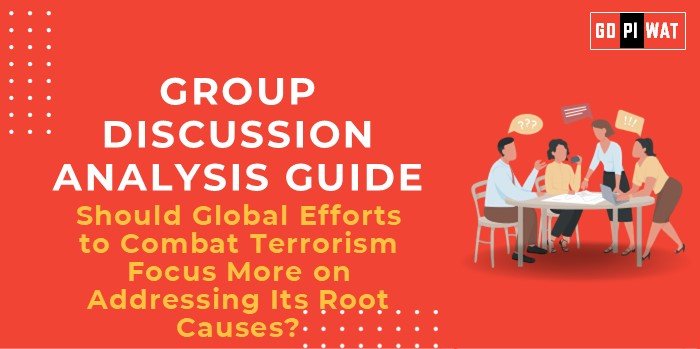📋 Group Discussion (GD) Analysis Guide: Should Global Efforts to Combat Terrorism Focus More on Addressing Its Root Causes?
🌐 Introduction to the Topic
- 📌 Opening Context: Terrorism remains one of the most pressing global challenges, affecting peace, security, and development. Efforts to combat terrorism often center on immediate threats, but there is growing recognition of the need to address underlying causes like poverty, political instability, and ideological extremism.
- 📖 Topic Background: Root causes of terrorism vary, including socio-economic inequalities, poor governance, and ideological indoctrination. Global frameworks like the United Nations Global Counter-Terrorism Strategy emphasize addressing these systemic issues alongside military and law enforcement actions.
📊 Quick Facts and Key Statistics
🌍 Economic Cost of Terrorism: Global losses from terrorism reached $26.4 billion in 2022 (Institute for Economics and Peace).
⚠️ Poverty and Terrorism Link: 90% of terror-related deaths occur in low-income or fragile states.
📚 Education Gap: Illiteracy rates in regions prone to extremism exceed 50%, undermining social resilience.
💰 Global Military Spending on Terrorism: Estimated at $1.98 trillion annually, often prioritized over developmental interventions.
⚠️ Poverty and Terrorism Link: 90% of terror-related deaths occur in low-income or fragile states.
📚 Education Gap: Illiteracy rates in regions prone to extremism exceed 50%, undermining social resilience.
💰 Global Military Spending on Terrorism: Estimated at $1.98 trillion annually, often prioritized over developmental interventions.
👥 Stakeholders and Their Roles
- 🏛️ Governments: Implement counter-terrorism laws, fund education, and improve governance.
- 🌍 International Organizations: United Nations and World Bank focus on conflict resolution and development aid.
- 🌱 Civil Society: Promotes awareness, combats radical ideologies, and provides local support.
- 📈 Private Sector: Offers job creation opportunities and invests in underdeveloped regions.
- 📚 Academia and Media: Conducts research and shapes narratives to combat ideological extremism.
🏆 Achievements and Challenges
✨ Achievements:
- 🌍 Global Initiatives: The Global Coalition against ISIS has reduced terror activities in hotspots.
- 📚 Educational Programs: UNESCO’s initiatives for at-risk youth promote resilience against extremism.
- 🤝 Regional Models: Colombia’s peace process with FARC shows progress through negotiation.
⚠️ Challenges:
- 📉 Persisting Poverty: Fuels recruitment in marginalized regions.
- ⚔️ Limited Cooperation: Inconsistent strategies hinder progress.
- 💻 Online Indoctrination: Radical ideologies spread unchecked on digital platforms.
🌍 Global Comparisons:
- ✔️ Success: Scandinavian countries integrate refugees with social programs.
- ❌ Challenge: Nigeria’s Boko Haram insurgency driven by youth unemployment.
Case Study: Deradicalization programs in Saudi Arabia combining psychological counseling with vocational training have shown promising results.
📢 Structured Arguments for Discussion
- ✅ Supporting Stance: “Addressing root causes like poverty and unemployment is critical to cutting off terrorism at its source.”
- ❌ Opposing Stance: “Immediate threats require military solutions; focusing on root causes is a long-term strategy.”
- ⚖️ Balanced Perspective: “A dual approach targeting immediate threats and root causes ensures sustainable progress.”
🧠 Effective Discussion Approaches
- 🎯 Opening Approaches:
- Statistical Impact: Highlight economic and human costs of terrorism.
- Contrast Approach: Compare military spending with development budgets.
- 🤝 Counter-Argument Handling:
- Example: “While military actions are essential, their long-term success depends on addressing systemic issues like education and governance.”
📊 Strategic Analysis of Strengths and Weaknesses
- Strengths: Increased global awareness, success in counter-terrorism partnerships.
- Weaknesses: Inconsistent funding for developmental programs.
- Opportunities: Strengthening international cooperation, leveraging technology to counter radical narratives.
- Threats: Political resistance in fragile states, escalation of cyberterrorism.
🎓 Connecting with B-School Applications
- 💼 Real-World Applications: Useful in subjects like geopolitics, corporate social responsibility, and risk management.
- 📚 Sample Interview Questions:
- “Should corporations invest in fragile regions to combat terrorism?”
- “How can counter-terrorism strategies improve governance in developing countries?”
- 💡 Insights for B-School Students:
- Explore partnerships between private and public sectors.
- Understand how development funding aligns with sustainable growth goals.


